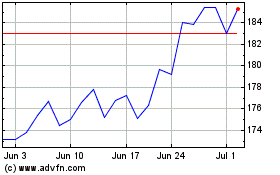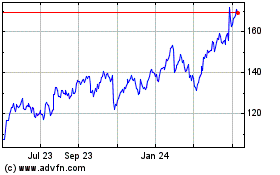Google Co-Founders Page, Brin Give Up Management Roles
December 03 2019 - 6:38PM
Dow Jones News
By Rob Copeland
Google's co-founders stepped down from their active management
roles at the internet giant, surrendering further control at a
potential inflection point for the company.
Billionaires Larry Page and Sergey Brin, who had been chief
executive and president, respectively, of Google parent Alphabet
Inc., said they would hand control immediately to Sundar Pichai,
Google's existing CEO.
The move instantly cements Mr. Pichai, an India-born immigrant
and longtime Google executive, as one of Silicon Valley's most
powerful figures. His purview now extends beyond search,
advertising and related products like YouTube into Alphabet's
far-flung ventures, like driverless cars and high-altitude balloons
and efforts to prolong life.
Mr. Pichai, 47 years old, also must now take on a larger role in
addressing the many regulatory and political threats that swirl
around the company and much of the tech industry.
Messrs. Page and Brin founded Google as Stanford University
students working out of a garage in 1998, and built it from a novel
search engine into a global conglomerate that controls how most of
the world interacts with the internet. They also created an
often-restless and freewheeling corporate culture, which became a
model for much of the tech industry but of late has been challenged
to match prior growth and mired in internal political debates.
Although still closely identified with the company, the
co-founders have been a dwindling visible presence inside the
Mountain View, Calif., campus for years, current and former
employees say. They haven't personally addressed employee
complaints, from across the political spectrum, that the company
culture has become conventionally corporate, and less open, than in
the past.
Google faces an unusually fierce collection of threats this
year. Competitors like Amazon.com Inc. are chipping at its
online-advertising business, while state and federal regulators are
beginning broad investigations of purported anticompetitive
behavior. Google has pledged to cooperate with the inquiries.
"While it has been a tremendous privilege to be deeply involved
in the day-to-day management of the company for so long, we believe
it's time to assume the role of proud parents," Messrs. Page and
Brin wrote in the letter. "We plan to continue talking with Sundar
regularly, especially on topics we're passionate about."
The duo are hardly giving up their influence. They remain on
Alphabet's board and together control a majority of voting power
over company decisions under Alphabet's dual-class share
structure.
Though their popular reputation is as a monolith, the pair has
at times disagreed about the direction of the company. Mr. Brin, 46
years old, has generally taken a libertarian, noninterventionist
approach to the flagship search results, while Mr. Page, also 46,
pushed for more "manual actions," or efforts to actively curate
results.
While still in their 20s, and with Google growing rapidly, they
brought in Silicon Valley veteran Eric Schmidt as CEO in 2001 for
what Mr. Brin famously referred to as "parental supervision." Mr.
Schmidt departed Alphabet's board in June.
As they step back further, Messrs. Page and Brin leave their
fingerprints all over the company, with many Google executives as
their handpicked choices. The head of YouTube, Susan Wojcicki, is
Mr. Brin's former sister-in-law and was the company's 16th
employee. The head of Google Maps, Jennifer Fitzpatrick, was in
Google's first class of interns, while search head Ben Gomes was
also hired in the first year.
Alphabet is valued at almost $900 billion. Shares are up roughly
24% this year, lagging behind the broader technology market.
Messrs. Page and Brin created Alphabet in 2015 as a holding
company that separated Google's massive business from other
less-mature units known as moonshots, which were expected to be
unprofitable for many years. All of the units reported to Mr.
Page.
At the time, the design was said to be modeled on the structure
of Warren Buffett's Berkshire Hathaway Inc. Thursday's moves appear
to mark a return to a more traditional corporate structure. The
company's market value has roughly doubled in the four years since
Alphabet was created.
Write to Rob Copeland at rob.copeland@wsj.com
(END) Dow Jones Newswires
December 03, 2019 18:23 ET (23:23 GMT)
Copyright (c) 2019 Dow Jones & Company, Inc.
Alphabet (NASDAQ:GOOGL)
Historical Stock Chart
From Aug 2024 to Sep 2024

Alphabet (NASDAQ:GOOGL)
Historical Stock Chart
From Sep 2023 to Sep 2024
